小学英语六年级下册Unit 3 We should learn to take are of ourselves
六年级下册英语教案-Unit 3 We should learn to take care of o
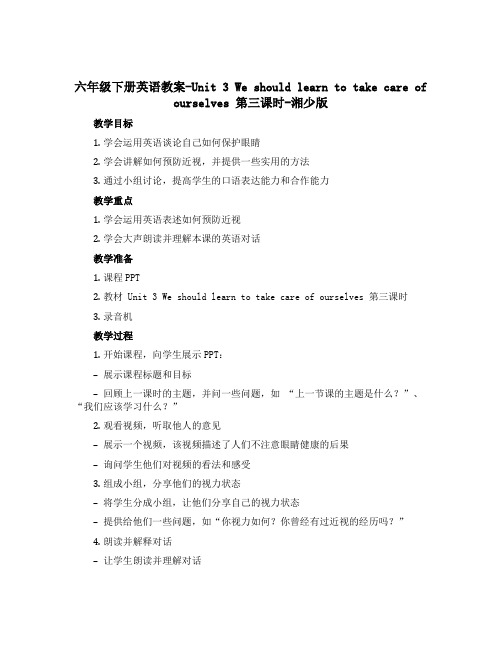
六年级下册英语教案-Unit 3 We should learn to take care ofourselves 第三课时-湘少版教学目标1.学会运用英语谈论自己如何保护眼睛2.学会讲解如何预防近视,并提供一些实用的方法3.通过小组讨论,提高学生的口语表达能力和合作能力教学重点1.学会运用英语表述如何预防近视2.学会大声朗读并理解本课的英语对话教学准备1.课程PPT2.教材 Unit 3 We should learn to take care of ourselves 第三课时3.录音机教学过程1.开始课程,向学生展示PPT:–展示课程标题和目标–回顾上一课时的主题,并问一些问题,如“上一节课的主题是什么?”、“我们应该学习什么?”2.观看视频,听取他人的意见–展示一个视频,该视频描述了人们不注意眼睛健康的后果–询问学生他们对视频的看法和感受3.组成小组,分享他们的视力状态–将学生分成小组,让他们分享自己的视力状态–提供给他们一些问题,如“你视力如何?你曾经有过近视的经历吗?”4.朗读并解释对话–让学生朗读并理解对话–解释其中的重点和生词,比如近视(nearsightedness)和远视(farsightedness)5.小组讨论–询问学生如何预防近视–安排每个小组发表他们的意见和建议–鼓励他们使用英语进行小组讨论6.授予奖项–评选出最佳小组,并向其颁发奖项–通过表扬鼓励学生,激发他们的积极性课堂总结•回顾课程目标和重点•鼓励学生在日常生活中注意眼睛健康,并采用预防近视的方法•提醒学生每天要保持适当的看书和用电脑时间课后作业•鼓励学生写一篇关于如何保护眼睛健康的英文小论文。
六下英语Unit 3 we should learn to take care of ourselves(湘少版)完美版

We should wash our _h__a_n__d_s__ before eating.
吃东西前,我们应该洗手。
We should wash our __f_a_c__e___ every day.
我们应该每天洗脸。
We should wash our _b__o_d__y___ every day.
See you next class!
风,没有衣裳;时间,没有居所;它们是拥有全世界的两个穷人生活不只眼前的苟且,还有诗和远方的田野。你赤手空拳来到人世间,为了心中的那片海不顾一切。 运动太多和太少,同样的损伤体力;饮食过多与过少,同样的损伤健康;唯有适度可以产生、增进、保持体力和健康。 秋水无痕聆听落叶的情愫红尘往事呢喃起涟
照顾
We should take care of ourselves. 我们自己
Then we can be strong and healthy.
强壮和健康
湘少英语六年级下册
Unit 3
We should learn
Part A
What should we do to take care of ourselves?
We can run, jog, _s__w_i_m_ and take long walks。 We want to be ___s_t_ro__n_g.
sing
draw
dance
We can sing, ______ and draw .We are ______.
happy
WWe hsahtousldhould we do to be healthy?
或者
I can help them to get on or off the bus. 我能帮他们上车或下车。
六年级英语下册Unit3《Weshouldlearntotakecareofourselves》 优秀课件7(新版)湘少版

(我们应该要学会照顾自己)
care 关心,呵护 Take care of = look after(照顾, 照料,照看) For example(例如): We should take care of(look after) our grandparents, because(因 为) they are old and weak.
He does Tai chi (太极) at the park
1.Listen and catch the main idea(听录音,找主旨)
Mr lin ‘s healthy habits(习 惯,方式) in life.
2. Read the story
1.年龄表示法 An 80- year – old man An 80 years old man
Wash our hands before eating
Wash our face everyday
Wash our body everyday
Keep (保持) our body clean
eat healthy [‘helθɪ] 健康的 day
Hour小时 一个小时 An hour 两个小时 Two hours
频率副词复习 Usually 常常 always 总是
Sometimes 有时
Often 经常
Never 从不
1.Listen and catch the main idea(听录音,找主旨) 2.Check your answers (a)How old is Mr Lin ? He is 80 years old . (b) What does Mr Lin do every morning ? He does tai chi . (c) What does he have for lunch ? He has rice with vegetables, fish and chicken.
六年级下册英语课件-Unit 3We should learn to take care of ourselves10湘少版
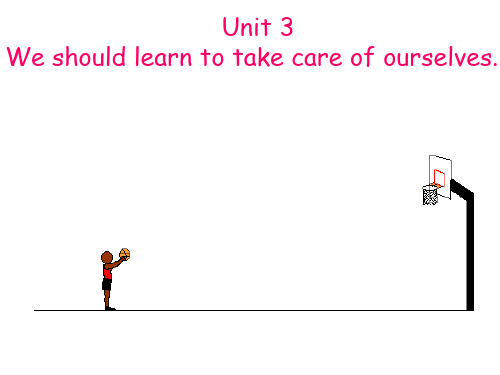
1. Answer the questions. (a) How old is Mr Lin?
(b) What does Mr Lin do every morning? (c) What does he have for lunch? 2. What do you learn from Mr Lin? Tick √ in the box. (a) We shouldnot eat any meat. (b) We should do exerciese every day. (c) We should watch TV all day. (d) Listening to music is good for us. (e) We should take long walks.
Unit 3 We should learn to take care of ourselves.
We should learn to take care of ourselves. Then we can be strong and healthy.
We should wash our hands before eating. We should wash our face and body every day. We should keep our body clean.
clean healthy
run, jog, swim, walk strong
sing, dance and draw happy
We should keep our body clean. We should wash our hands before eating.
We should eat healthy food. We can eat vegetables, fish, meat and fruit.
六年级下册英语Unit 3 We should learn to take care of湘少版

a piece of
wood
grandparent meat
cross
together
its
happily
Unit 3
We should learn to take care of ourselves. 我们应该学会照顾我们自己。
take care of [keə]照顾;照料;关怀
healthy
We should keep our body clean.
我们应该保持身体清洁。
We should eat healthy food. We should eat vegetables , fish and fruit. We want to be healthy.
我们应该吃健康的食物。 我们应该吃蔬菜,鱼和水果。 我们想要健康。
[’eksəsaɪz]
jog
[dʒɒg]慢跑
jog and walk
[wɔːk]
[dʒɒg] 慢跑和散步
wash our hands wash our face and body We should keep our body clean eat healthy food do exercise every day
Write down your answer. 1. How old are you?
I'm
2. Where do you go for your exercise? I do exercise
3. What do you have for lunch? I have
4. What do you do to be happy? I
We should...
We can\want to be...
六年级下册Unit 3 We should learn to take care of ourselves.Period 1

对 学
1、对子齐读课文2遍,注意读音,相互纠 错。不会读的可向其他对子求助。
2、对子相互讨论并理解每幅图中句子的意思。
群 学(预展)
小组选定展示方案,组长带领组员预展。做好 组员分工,要人人有任务。
1、方案一:朗读达人秀 (齐读、组长带读、分角 色读B部分……3颗星)
2、方案二:展示达人秀(组员用本课所学句型表 达自己对养成健康生活习惯的建议或想法......5颗 星)
如:S1: We should...
S2:…
带读等方式。)
2、观展同学注意对照课文认真倾听,心 里默默准备质疑点评的话语。
Part A: We should learn to take care of ourselves .
Then we can be strong and healthy.
自学:
听A部分录音,说说你都听到了些 什么? 2.小声试读A 部分对话,勾画出对话 里面的短语,并写上翻译。 3.我能指着课文内容跟着老师大声朗 读,将课文读熟悉。
We can also do some things to make us feel happy !
sing dance draw
自学一:
大声的读一读B部分短语,
一个三遍,并且写上中文。
对学:
小对子齐读B部分短语,一个两
遍。
注意读音,相互纠错。不会读的可向其他对 子求助。
对子展示
1、对子大声朗读B部分内容。(可采用齐读、
['bɒdɪ]
eat healthy food 健康的食物
We should eat…
vegetables
fish
fruit
A: Why do we eat healthy food? we want to be healthy B: Because _______________________. 保持健康
六年级英语下册Unit3WeshouldlearntotakecareofourselvesPeri
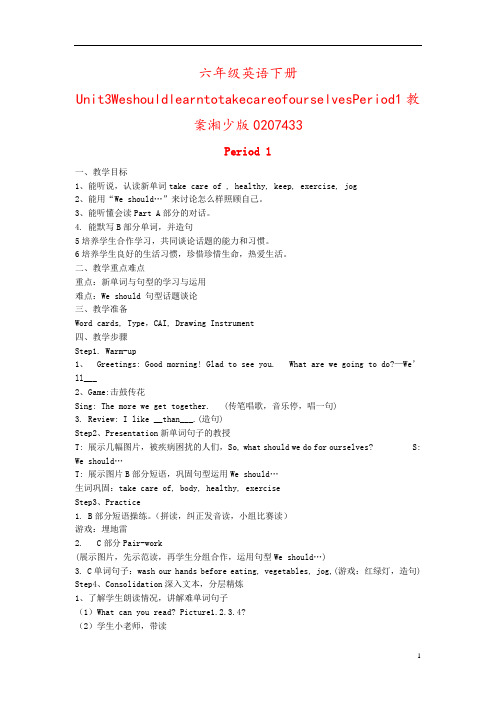
六年级英语下册Unit3WeshouldlearntotakecareofourselvesPeriod1教案湘少版0207433Period 1一、教学目标1、能听说,认读新单词take care of , healthy, keep, exercise, jog2、能用“We should…”来讨论怎么样照顾自己。
3、能听懂会读Part A部分的对话。
4. 能默写B部分单词,并造句5培养学生合作学习,共同谈论话题的能力和习惯。
6培养学生良好的生活习惯,珍惜珍惜生命,热爱生活。
二、教学重点难点重点:新单词与句型的学习与运用难点:We should 句型话题谈论三、教学准备Word cards, Type,CAI, Drawing Instrument四、教学步骤Step1. Warm-up1、Greetings: Good morning! Glad to see you. What are we going to do?—We’ll___2、Game:击鼓传花Sing: The more we get together. (传笔唱歌,音乐停,唱一句)3. Review: I like __than___.(造句)Step2、Presentation新单词句子的教授T: 展示几幅图片,被疾病困扰的人们,So, what should we do for ourselves? S: We should…T: 展示图片B部分短语,巩固句型运用We should…生词巩固:take care of, body, healthy, exerciseStep3、Practice1. B部分短语操练。
(拼读,纠正发音读,小组比赛读)游戏:埋地雷2. C部分Pair-work(展示图片,先示范读,再学生分组合作,运用句型We should…)3. C单词句子:wash our hands before eating, vegetables, jog,(游戏:红绿灯,造句) Step4、Consolidation深入文本,分层精炼1、了解学生朗读情况,讲解难单词句子(1)What can you read? Picture1.2.3.4?(2)学生小老师,带读2、朗读感悟Listen and repeat3、操作练习读通读顺课文对话有感情的朗读对话:能够边做动作,边说。
湘教版小学英语六年级下册Unit 3 We should learn to take care of ourselves

Unit 3 We should learn to take care of ourselves 一、重点词汇积累:healthy 健康的 keep 保持 exercise 锻炼;练习jog 慢跑 take care of 照顾 wash hands 洗手do exercise 做运动 take long walks 长距离散步every day 每天 feel happy 感到开心eat healthy food 吃健康食品an 80-year-old man 一个八十岁的老人have a rest 休息 one or two hours 一两个小时go to bed 上床睡觉二、实用句型集锦:1.We should learn to take care of ourselves.我们应该学习会照顾我们自己。
2. We should wash our hands before eating. 我们应该饭前洗手。
3. We should eat healthy food。
我们应该吃健康食品。
4.We should do exercise every day.我们应该每天做运动。
5. We want to be strong。
我们想要变强壮。
6. At night, he sometimes watches TV for one or two hours. 在晚上,他有时看一两个小时电视。
7. For lunch, he has rice with vegetables, fish and chicken. 午饭,他吃米饭加蔬菜、鱼和鸡肉。
三、名师精析1. We should learn to take care of ourselves.我们应该学习会照顾我们自己。
should 为情态动词,意为“应该”, 后接动词原形。
learn to +动词原形, 表示“学习做某事”如:I want to learn to cook.我想要学习做饭。
六年级下册英语课件-Unit 3We should learn to take care of ourselves10_湘少版
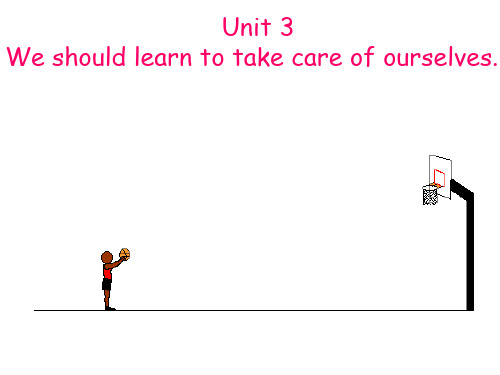
Write down your answer. 1. How old are you?
I'm
2. Where do you go for your exercise? I do exercise
3. What do you have for lunch? I have
4. What do you do to be happy? I
eat vegetables, fish, fruit
healthy
run, jog, swim, walk strong
sing, dance and draw happy
We should keep our body clean. We should wash our hands before eating.
Unit 3 We should learn to take care of ourselves.
We should learn to take care of ourselves. Then we can be strong and healthy.
We should wash our hands before eating. We should wash our face and body every day. We should keep our body clean.
1. Answer the questions. (a) How old is Mr Lin?
(b) What does Mr Lin do every morning?
(c) What does he have for lunch?
2. What do you learn from Mr Lin? Tick √ in the box. (a) We shouldnot eat any meat. (b) We should do exerciese every day. (c) We should watch TV all day. (d) Listening to music is good for us. (e) We should take long walks.
六年级英语下册Unit3Weshouldlearntotakecareofourselve

Unit 3 We should learn to take care of ourselves.教师授课时间月日星期课时课题Unit 3 We should learn to take care of ourselves. 课型新授教学目的(一) 语言目标1. 词汇:(1) 能听懂、会说、认读词组keep our body clean, eat healthy food, feel happy, doexercise every day等。
(2) 听得懂、会说、会读、会写单词take care of, healthy, keep, exercise, jog等。
2. 句型:用“We should ...”“We can ...”和同伴表达自己对养成健康生活习惯的建议或想法。
(二) 应用目标1. 能表达应该做某事。
2. 知道什么是良好的生活习惯,并能表达养成良好生活习惯应该做到的事情。
3. 能听懂、会说A部分的课文。
重点(1) 能听懂、会说、认读新词组keep our body clean, eat healthy food, feel happy, do exercise every day。
(2) 能用“We should ...”“We can ...”和同伴表达自己对养成健康生活习惯的建议或想法。
难点(1) should的发音和运用。
(2) 对结构较为复杂的词组的理解和表达,如learn to take care of ourselves。
因为学生初次接触,教师需引导学生读的时候根据意群进行停顿,帮助学生按意群来理解长句。
教学准备教学动画等,“连词成句”活动单词卡,作业纸(表格)。
教学过程Step 1 热身/ 复习(Warm-up/Revision)1. Game气球爆炸从屏幕底部依次升起大量的气球,学生要抢在气球爆炸前快速认出气球上的动词,大声读出来并用动作表演出来。
气球可以分两批出现,第一批为单个动词,如sing, dance, draw, eat, drink, wash, swim, walk, run, listen, read;第二批为动词词组类,如sing a song, drawpictures, eat fish, drink water, wash our face, wash hands, eat food, do exercise, listen to music, watch TV, go to bed, read books。
六年级下册英语课件-Unit 3We should learn to take care of ourselves5_湘少版
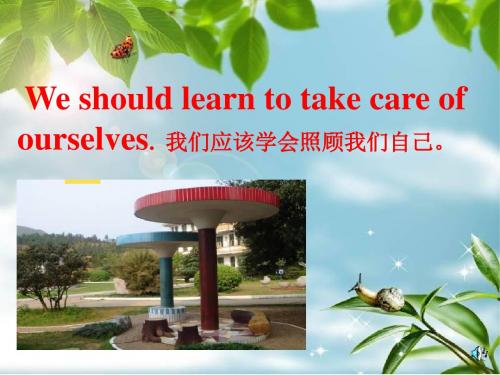
我们应该保持身体清洁。
We should eat healthy food. We should eat vegetables , fish and fruit. We want to be healthy.
我们应该吃健康的食物。 我们应该吃蔬菜,鱼和水果。 我们想要健康。
We should learn to take care of ourselves. 我们应该学会照顾我们自己。
wash our hands wash our face and body We should … keep our body clean eat healthy food do exercise every day
We should do exercise every day. It ’s good for us. We can run, jog, swim and take long walks. We want to be strong.
We can sing, dance and draw. We are happy.
We should wash our hands every day before ea Nhomakorabeaing.
before [bɪ'fɔː]在…之前
should +动词原形(should用来提出建议
和忠告)
We should wash our face and body every day.
我们应该每天洗脸和洗澡。
Good bye!!!
六年级英语下册课件-Unit 3 We should learn to take care of ourselves(138)-湘少版

Read books
y
Do exercise
Eat healthy food
We should keep our body clean.
我们应该保持身体清洁。
should +动词原形,应
该······(should用来提出建 议和忠告)
We should eat healthy food. We should eat vegetables , fish and fruit. We want to be healthy.
wash our hands wash our face and body keep our body clean
eat healthy food
do exercise every day
Homework: 1,Copy the words and make four sentences.(We should…...) 2,Read the part A.
Unit 3 We should learn to
take care of ourselves.
我们应该学会照顾我们自己。
Look at these pictures, what should we do for ourselves?
take care of 照顾;照料;关怀
keep our body clean
do exercise every day
[’eksəsaɪz]
jog
[dʒɒg]慢跑
Practice:look and say
keep our body clean
eat healthy food
do exercise every day
feel happy
- 1、下载文档前请自行甄别文档内容的完整性,平台不提供额外的编辑、内容补充、找答案等附加服务。
- 2、"仅部分预览"的文档,不可在线预览部分如存在完整性等问题,可反馈申请退款(可完整预览的文档不适用该条件!)。
- 3、如文档侵犯您的权益,请联系客服反馈,我们会尽快为您处理(人工客服工作时间:9:00-18:30)。
我们应该学会照顾自已。
learn是动词,意为“学习、知悉、了解”, 后接动词不定式,即“learn to+动词原形”结构, 表示“学习做某事”。
例句:我正在学游泳。
I am learning to go swimming.
拓展:
learn作动词,后面还可直接接名词后宾语。 另外,learn from sb.意为“向某人学习”。
I want to be a scientist.
拓展:
“want +to +动词原形”表示“想要做某事”。 “want +sb. +to +动词原形”表示“想要某人
做某事”。 例句:我现在想回家了。
I want to go home now.
3. We can run, jog, swim and take long walks.
刘文住在中国上海。她每天早上去跳舞。她正和一大群人 在公园里跳舞。他们玩得很开心,并且保持身体健康。
Benson lives in New York, the USA. He meets his friends every afternoon. They play basketball in the playgroup. They have fun and keep fit.
表示允许: 例句:你可以做在这里。
You can sit here.
表示推测(主要用于否定句和疑问句): 例句:这个故事可能是真的吗?
Can the story be true?
Let’s Learn
keep our body clean 保持我们的身体干净
eat healthy food 吃健康的食物
×
(d) Listening to music is good for us. √
(e) We should take long walks.
√
Let’s Write
Write down your answer.
1.How old are you?
I’m 11
.
2.Where do you go for your exercise?
例句:我通常乘公汽上学。
I usually go to the school by bus.
拓展:常见的频度副词还有: often(经常,常常),sometimes(有时候),
always(总是,一直),never(从不)。 通常说来,always表示100%,usually表示80%,
often表示60%,sometimes表示40%,seldom表示 20%,never表示0%。
In the morning he does tai chi at the park. Then, ____h_e_t_a_k_e_s_a__lo_n_g__w_a_l_k__a_ro_u_n__d_t_h_e_p__a_rk__. A__f_te_r_t_h_at,
he goes home to have a rest.
我们可以跑步、慢跑、游泳和长途步行。
can是情态动词,后接动词原形;意为“可以,
会,能” 例句:我会说英语。
I can speak English.
拓展:can作情态动词,还有其他的用法:
表示请求: 例句:我可以用下你的笔吗?可以。
—Can I use your pen? —Yes, you can.
feel happy 感到快乐
do exercise every day 每天锻炼
Language points
feel happy 感到快乐 feel是系动词,意为“感到”,其后接形容词
作表语,翻译成“摸起来,感觉起来”。 例句:今天我感觉非常开心。
I feel very happy today.
指深入系统地学习,带有努力,勤奋的意味。其学习 对象往往是科学,艺术和需要深入探讨,研究的问题 及学科,不是单纯地获得技巧。
2. We want to be healthy. 我们想要变得健康。 “want to be+形容词”意为“想要变成……”,
后面常接表示职业的名词或状态的形容词。 例句:我想成为一名科学家。
点击画面 播放视频
We should wash our hands before eating. We should wash our face and body every day. We should keep our body clean.
我们应该在吃东西前洗手。我 们应该每天洗脸、洗澡。我们应该 保持身体干净。
This is the way we brush our teeth, brush our teeth, brush our teeth. This is the way we wash our face, wash our face, wash our face. This is the way we ex-er-cise, ex-er-cise, ex-er-cise. This is the way we brush our teeth, ear-ly, in the morning. This is the way we wash our face, ear-ly in the mor-ning. This is the way we ex-er-cise, ear-ly in the mor-ning.
We can swim, run, jog and walk.
We should eat healthy food. We can eat vegetables, fish, meat and fruit.
We should be happy.
Let’s Read
点击画面 播放视频
Mr Lin is an 80-year-old man. He is very healthy. He does exercise every day. Early in the morning he does tai chi at the park. Then, he takes a long walk around the park. After that, he goes home to have a rest. For lunch he has rice with vegetables, fish and chicken. In the afternoon, he usually reads newspapers ad listens to music. At night, he sometimes watches TV for one or two hours. He always goes to bed before 10:00 p.m. He’s happy and healthy.
2.What do you learn from Mr Lin?
Tick √ in the box.
(a) We should not eat any meat.
×
(b) We should do exercise every day. √
(c) We should watch TV all day.
按照频率从高到低依次是: always>usually>often>sometimes>seldom>never。
1.Answer the questions. (a)How old is Mr Lin?
_H_e__is_a_n__8_0_-_y_e_a_r-_o_l_d_m__a_n_.___________ (b)What does Mr Lin do every morning?
We should eat healthy food. We should eat vegetables, fish and fruit. We want to be healthy.
我们应该吃健康的食物。我 们应该吃蔬菜、鱼和水果。我们 想要变得健康。
We should do exercise every day. It’s good for us. We can run, jog, swim and take long walks. We want to be strong.
Let’s Know More
Exercise is good for our health
Liu Wen lives in Shanghai, China. She goes dancing every morning. She’s dancing with a big group of people in the park. They have fun and keep fit.
___________________________________________
(c)What does he have for lunch? _F_o_r_l_u_n_c_h_h__e_h_a_s_r_i_c_e_w__it_h_v_e_g_e_t_a_b_le_s_,_f_is_h__a_n_d_ _ch__ic_k_e_n_._________________________________
注意:80-year-old当形容词, 80 years old当名词。
2. he usually reads newspapers ad listen to music.
他通常看报纸、听音乐。
usually是频度副词,表示某事发生或做某事的
频率,意思是“通常”,位于实义动词之前,系动 词、助动词或情态动词之后。
I do exercise at the park
